|
|
|
Sort Order |
|
|
|
Items / Page
|
|
|
|
|
|
|
| Srl | Item |
| 1 |
ID:
097536
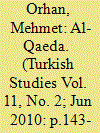

|
|
|
| 2 |
ID:
123127
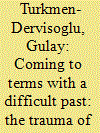

|
|
|
|
|
| Publication |
2013.
|
| Summary/Abstract |
This paper takes as its subject the question of why some nations are less willing to acknowledge past atrocities. To answer that question, it focuses on the assassination of Hrant Dink - a Turkish-Armenian journalist - and its repercussions on Turkish national identity. Scrutinising newspaper articles written before and after the assassination (2004-2007), it casts a detailed glance at the struggle between two carrier groups - pro- and anti-acknowledgement groups - and argues that the assassination increased the likelihood of the acknowledgement of the mass killing of Armenians in 1915 by creating a cultural trauma informed by collective guilt. However, the relief generated by the funeral, combined with the strength of the master commemorative narrative regarding the mass killings, decreased that likelihood, and despite the huge public reaction created by the assassination there was no attempt at acknowledgement. As such, the paper contributes to our understanding of the trauma of perpetrators and claims that, in addition to other factors listed by earlier studies, cultural trauma is a necessary but not a sufficient condition for coming to terms with difficult pasts.
|
|
|
|
|
|
|
|
|
|
|
|
|
|
|
|
| 3 |
ID:
190685
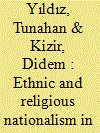

|
|
|
|
|
| Summary/Abstract |
This article compares the ideas of Hüseyin Nihal Atsız and Seyyid Ahmet Arvasi, two iconic ideologues of ethnic and religious nationalism in Turkey, respectively, on the issues of history, identity, and national ideal. It first argues that Atsız mainly presents a history of Turkish supremacism whereas Arvasi embraces a method of Islamization to remember history. It also demonstrates that Atsız tends to equate the racial and the national while Arvasi uses Islamic legitimacy for Turkish identity and nationalism. It is also evident that while Atsız offers classical pan-nationalism, Arvasi shows third-worldist and universalistic tendencies in defining Turkish destiny.
|
|
|
|
|
|
|
|
|
|
|
|
|
|
|
|
| 4 |
ID:
111240
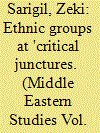

|
|
|
| 5 |
ID:
121873


|
|
|
|
|
| Publication |
2013.
|
| Summary/Abstract |
This article studies 1923 compulsory population exchange between Greece and Turkey through a case study of its experience in Izmir. It traces the ways the early Republican state engaged in the project of reshaping the population by eliminating the non-Muslims who were rendered as 'excesses' in the spatial and discursive matrices of the nation-state. Through the experience of the exchange in Izmir, it argues that the process of the accommodation and assimilation of the exchangees played a significant role in shaping the modalities of Turkish nationalism by creating new lines and fissures, further dividing the 'Muslim brethren' into ever restrictive constructions of Turkishness. It also underlines that this forced displacement is not just a significant episode in Greek and Turkish histories but that it represents a turning point in the project of nation formation in general.
|
|
|
|
|
|
|
|
|
|
|
|
|
|
|
|
| 6 |
ID:
153591


|
|
|
|
|
| Summary/Abstract |
In 1939, a comprehensive and systematic translation movement began in Turkey under the supervision of ‘Turkish humanists’ who believed in the survival of the traces of ancient Greek culture within the daily lives and literary traditions of Anatolian peoples. This article, which is based on the premise that translations should be discussed as records of cultural contestation and ideological struggles rather than as simple linguistic transpositions, examines this state-sanctified movement vis-à-vis the nationalist project. The Turkish humanists’ belief in a geography-based nationalism was promoted by the state insofar as their attempt to influence the direction of the development of ‘nascent’ Turkish identity and literature coincided with the aims of the state. Ostensibly initiated to introduce the Turkish reading public to Western classics, the translated texts were used, I argue, as a means in fashioning and controlling the emergent national identity during the first decade of the Inonu era.
|
|
|
|
|
|
|
|
|
|
|
|
|
|
|
|
| 7 |
ID:
120764
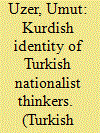

|
|
|
|
|
| Publication |
2013.
|
| Summary/Abstract |
This article purports to study the national identity of two influential ideologues of Turkish nationalism, Ziya Gökalp and Ahmet Arvasi, their approach to Kurds and their rejection of such affiliations regardless of their background in a predominantly Kurdish milieu. Their worldviews were strikingly different regarding social matters but they both shared a common view regarding the hegemonic position of Turkish identity even in a Kurdish-majority region.
|
|
|
|
|
|
|
|
|
|
|
|
|
|
|
|
| 8 |
ID:
111242
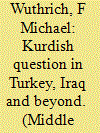

|
|
|
| 9 |
ID:
173200
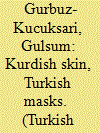

|
|
|
|
|
| Summary/Abstract |
Evdirrehîm Hekarî is mostly known for his Kurdish nationalist writings and activism at the end of the Ottoman Empire. He continued to be a voice for the Kurdish nation during the Republican period in his private writings, while he identified as a Muslim Turk in his publications. Hekarî’s complete rejection of secular Turkishness existed alongside his submission to Turkish Islamic discourse. His split identity and paradoxes are analyzed using Frantz Fanon’s study of the colonized man and his inconsistencies in his fight with the colonizer. In examining Hekarî’s inner inconsistencies, the article also benefits from Partha Chatterjee’s study of the contradictions of nationalist thought in its battle with colonialist power.
|
|
|
|
|
|
|
|
|
|
|
|
|
|
|
|
| 10 |
ID:
103242


|
|
|
| 11 |
ID:
146770
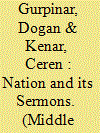

|
|
|
|
|
| Summary/Abstract |
This article will attempt to develop an in-depth examination of the pivotal role of Islam in the articulation of Turkish nationalism and Turkish official identity by examining the sermons authorized and imposed by the Presidency of Religious Affairs (PRA), the state agency regulating religion, and how the their cosmologies of social, moral and political order are entwined. We will further argue that this role involves a twofold process; firstly, the Muslim identity was imagined as a prerequisite for being considered as a Turk and a Turkish citizen and, secondly, the ‘cultural intimacy’ of Turkish nationalism is grounded on the ‘root paradigms’ inherited and attained from the Islamic tradition and theology. These arguments are particularly pertinent at a time when Islamist JDP (Justice and Development Party) consolidated its power and began to instrumentalize PRA for its priorities and visions of Islam. This, however, does not bring a radical reshuffling of PRA. On the contrary, the continuity from the Kemalist-monitored PRA to the JDP-monitored PRA can be attested not only in its organizational features but also in its ideological make up; especially in terms of its perceptions of society, state and social order.
|
|
|
|
|
|
|
|
|
|
|
|
|
|
|
|
| 12 |
ID:
133526
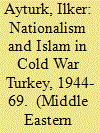

|
|
|
|
|
| Publication |
2014.
|
| Summary/Abstract |
Our current knowledge on the history of Turkish nationalism during the Cold War is a blend of facts and myths. One of those myths is the argument that the Turks developed a special relationship with Islam following their massive conversion in the eleventh century to the extent that religion has become the most important ingredient in Turkish national identity over time, even more pronounced than ethnic attributes. Secular visions of Turkish nationalism, on the other hand, which emphasize ethnic characteristics, are generally regarded as curious but unimportant exceptions. This article challenges that narrative and maintains that the alleged unimportance of secular nationalism is an invention of the late 1960s. It provides evidence that there was no consensus among Turkish nationalists on the question of Islam; on the contrary, the role of Islam in the making of Turkish identity was the most hotly debated topic among rival nationalist circles. It was not until the turning point in 1969 that a host of factors such as demographic change, anti-Kemalist and anti-RPP sentiments, and electoral behaviour in Cold War Turkey convinced Turkish nationalists to adopt a more Islamic-leaning discourse to be more successful at the ballot box.
|
|
|
|
|
|
|
|
|
|
|
|
|
|
|
|
| 13 |
ID:
111241


|
|
|
| 14 |
ID:
121874
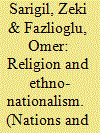

|
|
|
|
|
| Publication |
2013.
|
| Summary/Abstract |
One approach within the Islamic camp treats Islam, which emphasizes overarching notions such as the 'Islamic brotherhood' and 'ummah', as incompatible with ethno-nationalist ideas and movements. It is, however, striking that in the last decades, several Islamic and conservative groups in Turkey have paid increasing attention to the Kurdish issue, supporting their ethnic demands and sentiments. Even more striking, the leftist, secular Kurdish ethno-nationalists have adopted a more welcoming attitude toward Islam. How can we explain such intriguing developments and shifts? Using original data derived from several elite interviews and a public opinion survey, this study shows that the struggle for Kurdish popular support and legitimacy has encouraged political elites from both camps to enrich their ideological toolbox by borrowing ideas and discourses from each other. Further, Turkish and Kurdish nationalists alike utilize Islamic discourses and ideas to legitimize their competing nationalist claims. Exploring such issues, the study also provides theoretical and policy implications.
|
|
|
|
|
|
|
|
|
|
|
|
|
|
|
|
| 15 |
ID:
001625


|
|
|
|
|
| Edition |
1st ed.
|
| Publication |
London, Frank Cass, 1997.
|
| Description |
x, 126p.hbk
|
| Standard Number |
0714630756
|
|
|
|
|
|
|
|
|
|
|
|
Copies: C:1/I:0,R:0,Q:0
Circulation
| Accession# | Call# | Current Location | Status | Policy | Location |
| 041215 | 956.1015/KUS 041215 | Main | On Shelf | General | |
|
|
|
|
|
|
|
|
|